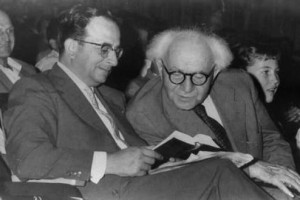David Ben-Gurion was an avid and devoted reader of the TANACH throughout his adult life in Israel, and in the process forged an abiding bond between himself and The Book of Books: “Since I had come to this land (Israel) I was shaped primarily by the TANACH. Here, in Eretz Yisrael, I had for the first time understood it in all its depth, and was influenced by it more than by any other book or literature – Jewish or non-Jewish alike”.
Among his many essays on TANACH and the Torah, Ben-Gurion dedicated a comprehensive essay to the book of Deuteronomy, which he considered unique among the books of Torah.
Ben Gurion opened his essay by pointing out a well-known fact: the book of Deuteronomy is primarily a “Mishne Torah” (Deuteronomy, 17:18), “a repetition, re-narrating many of the events and the laws” that had appeared earlier in Torah. Yet, he claimed that the book is unique and proposed, ”the book has its own distinctive ethical and prophetic orientation …much more than the earlier Torah books.” For Ben Gurion the book’s unique aspect is expressed in the following five defining themes:
1.A clear emphasis in Deuteronomy on the oneness and love of the Creator, which is expressed in the most revered verse in Jewish tradition: “Shema Yisrael Adonai Eloheinu Adonai Ehad,” “Hear O Israel The Lord is our God the Lord is one” (Deuteronomy 6:4). The book offers the first utterance of God’s oneness, “The Lord alone is God, there is none beside Him” (4:35) and a clear designation of a single ritual space (“in the place that God will choose”). Moreover, in no other book is there such great emphasis on loving God: “and you shall love the Lord your God with all your heart and with all your soul and with all your might” (6:5) and again a call “to love Him” (10:12) repeated in 11:1 “Love the Lord your God” and 13 verses later, “Loving the Lord your God.”
2. “To refrain from wronging others and to love justice” is paramount in the book, according to Ben Gurion. There is a clear injunction to do justice in Deuteronomy that comes up several times: “And decide justly between a person and fellow Israelites or a stranger” (1:16) and a call to the judges who “shall govern the people with due justice…Justice, justice you shall pursue” (16:18, 20) and numerous similar teachings. Ben Gurion added that just as Deuteronomy underscores justice, it emphasizes the prohibition on wronging or misusing the marginalized, “You shall not abuse a needy and destitute worker, whether a fellow of your people or a stranger in your land. You must pay him his wages on the same day” (24:14, 15). Moreover, it is a forbidden to inform on a runaway slave “who seeks shelter with you” (23:16,17). Ben Gurion contrasted the Torah’s banning of returning a slave to its owners to the harsh slavery laws in America, “That prohibition to Israelites was written three thousand years ago, yet in America some hundred years ago there was a civil war over the issue of slavery supported by the Southern states.”
It is meaningful according to Ben Gurion that Deuteronomy clarifies that family members are not responsible for transgressions of relatives, “a person shall be punished only for his own crime” (24:16).
3.Promoting Support for the poor, the stranger, the orphan and the widow is an ethical principle that is repeated numerous times with the caveat of remembrance: “Remember that you were slaves in Egypt” (5:12, 15, 16:11, 14). Ecology and ethics are connected, laws pertaining to letting the land rest every seven years take on social and humanist meanings in terms of forgiving of debts, “every seventh year you shall practice remission of debts” (15:1, 2).
4.”Chosen People” – a concept that was first mentioned in Exodus and is often misinterpreted as a chauvinist self-congratulating phrase, receives according to Ben Gurion, in Deuteronomy a firm divine clarification, “For you are a people consecrated to the Lord your God; of all the people on earth the Lord your God chose you to be His treasured people” and “God has affirmed this day that you are, as He promised you, His treasured people…you shall be as He promised a holy people to the Lord your God” (26:18, 19).
5. The promise of the ingathering of exiles, in Hebrew Kibbutz Galuyot, is prophetically expressed in Deuteronomy and is without parallel in any of the other books of Torah: “The Lord your God will restore your fortunes and take you back into his love. He will bring you together again from all the peoples where the Lord your God has scattered you…And the Lord your God will bring you to the land that your forefathers possessed and you shall possess it” (30:3, 5).
For Ben Gurion all of these elements constitute the unique aspects of Deuteronomy; together they become throughout Jewish history major guiding ethical principles of justice, of Israel’s special and essential mission, and outline a relationship between God and the people Israel that includes a prophetic return from exile to the promised land.

Looking at the TANACH
at the national Bible Quiz
Translated from the Hebrew by Ayala Emmett